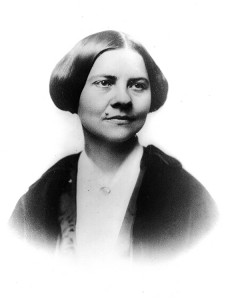Lucy Stone 200
Tuesday, August 14th, 2018August 14, 2018
On Aug. 13, 1818, 200 years ago yesterday, American abolitionist and suffragist Lucy Stone was born near West Brookfield, Massachusetts. Stone helped organize the women’s rights movement in the United States. She was one of the first American women to lecture on women’s rights and probably the nation’s first married woman to keep her maiden name. After a life spent fighting against discrimination and inequality, Stone died at age 75 on Oct. 18, 1893.

Lucy Stone, an American leader of the women’s rights movement, was born 200 years ago on Aug. 13, 1818. Credit: Library of Congress
Few women of Stone’s day went to college, but she began to teach school at the age of 16 to earn money so she could go. She entered Oberlin College in Ohio in 1843 and joined the abolitionist movement. In 1847, she became one of the first Massachusetts women to earn a college degree. After graduating from college, Stone lectured in the United States and Canada on abolitionism and, later, on women’s rights. She viewed slavery and widespread discrimination against women as linked evils of society. Stone helped organize the first national convention on equal rights for women, held in Worcester, Massachusetts, in 1850.
In 1855, Stone married Henry Blackwell, a merchant and abolitionist. They omitted the word obey from their marriage vows and promised to treat each other equally. Stone continued to use her maiden name and even refused to open mail addressed to Mrs. Henry Blackwell. The phrase Lucy Stoners came to refer to women who kept their maiden names after marriage.
In 1869, Stone helped establish the American Woman Suffrage Association, which worked for women’s right to vote. Stone also founded the group’s newspaper, Woman’s Journal. Stone worked with and influenced such fellow women’s rights activists as Susan B. Anthony and Elizabeth Cady Stanton.
In 1968, the U.S. Postal Service included Stone in its “Prominent Americans” stamp series. In 1999, a bronze bust of Stone was placed in the Massachusetts State House in Boston. In 2003, sculptor Meredith Bergmann included Stone in the Boston Women’s Memorial that also features former First Lady Abigail Adams and African American poet Phillis Wheatley.


